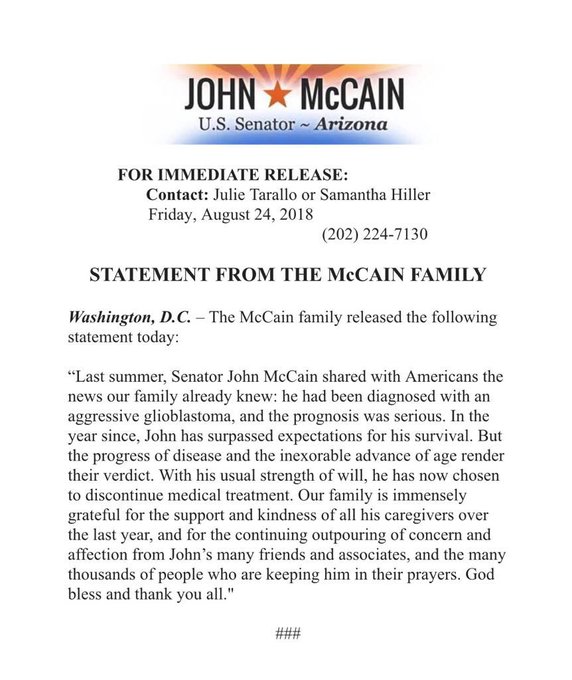Arizona Republican Sen. John McCain, who has been fighting an aggressive form of brain cancer for more than a year, will discontinue treatment for the disease, his family announced Friday.
That decision suggests the 81-year-old McCain could be nearing death.
"John has surpassed expectations for his survival. The progress of disease and the inexorable advance of age render their verdict," McCain's family said in a statement. "With his usual strength of will, he has now chosen to discontinue medical treatment."
"Our family is immensely grateful for the support and kindness of all his caregivers over the last year, and for the continuing outpouring of concern and affection from John’s many friends and associates, and the many thousands of people who are keeping him in their prayers," the family continued. "God bless and thank you all."
Sen. McCain discontinuing medical treatment for brain cancer
AUG.24.201806:52
In July 2017, McCain revealed that he’d been diagnosed with a form of brain cancer called glioblastoma and began an aggressive treatment regimen.
While he returned to the U.S. Capitol in the months after his diagnosis, McCain has largely remained at home in Arizona since May, after undergoing surgery for an intestinal infection.The senator, the 2008 GOP presidential nominee, said in an audio excerpt aired by NPR that month, "I don't know how much longer I'll be here."
His wife, Cindy McCain,and daughter, Meghan McCain, both tweeted personal messages along with the family's statement.
"I love my husband with all of my heart. God bless everyone who has cared for my husband along this journey," Cindy McCain wrote.
"My family is deeply appreciative of all the love and generosity you have shown us during this past year," Meghan McCain wrote. "Thank you for all your continued support and prayers. We could not have made it this far without you — you've given us strength to carry on."
Support from McCain's Senate colleagues, as well as members of Congress and governors, also poured in.
Senate Majority Leader Mitch McConnell, R-Ky., tweeted that he was "Very sad to hear this morning's update from the family of our dear friend @SenJohnMcCain" and that "the entire McCain family are in our prayers at this incredibly difficult hour." Senate Minority Leader Chuck Schumer, D-N.Y., tweeted, "My thoughts and prayers are with Senator McCain and his family."
House Speaker Paul Ryan, R-Wis., tweeted that "personifies service to our country," while John Kerry, a former secretary of state and Democratic senator from Massachusetts, called him "a brave man showing us once again what the words grace and grit really mean."
Mitt Romney, the GOP's 2012 presidential nominee, tweeted, "No man this century better exemplifies honor, patriotism, service, sacrifice, and country first than Senator John McCain." Former Arizona Gov. Jan Brewer called the news "heartbreaking."
McCain first emerged as a household name during the Vietnam War, when he was shot down and held as a prisoner of war by the North Vietnamese from October 1967 until March 1973. His captors tortured him and held him in solitary confinement. Still, he declined an offer of early release until those who had been at the prison longer than he was were let go.
He took his seat in the U.S. Senate in 1987, replacing the venerable conservative Barry Goldwater, and has been regarded during his more than three decades in the chamber as a tell-it-like-he-sees-it voice open to crossing the aisle to reach bipartisan agreement.
McCain, however, has consistently attracted the ire of President Donald Trump, who in 2015, as a candidate, said McCain was considered a war hero only "because he was captured" during the Vietnam War and that Trump preferred military figures who avoided being taken prisoner by the enemy.
Trump has also repeatedly criticized McCain for his "no" vote that helped doom a key Obamacare repeal bill in the Senate.
In addition, in May a top White House communications aide, Kelly Sadler, made fun of McCain's brain cancer diagnosis, saying, "He's dying anyway."
NBC News reported in May that people close to McCain told the White House that the ailing senator did not want Trump to attend his funeral and would like Vice President Mike Pence to come instead.
And last month, during the signing of the John S. McCain National Defense Authorization Act for Fiscal Year 2019, Trump chose not to mention McCain's name at all, even omitted McCain's name when citing the title of the bill.








Comments
Post a Comment